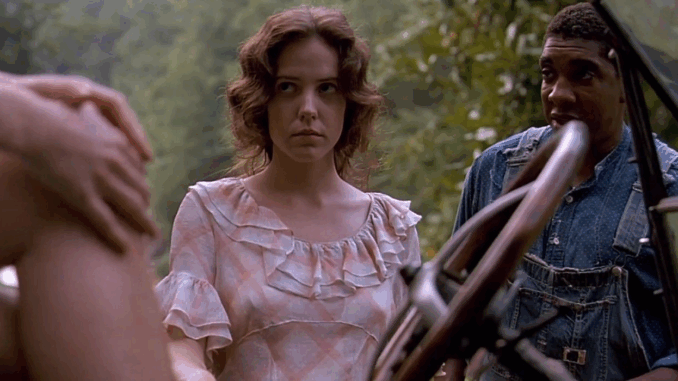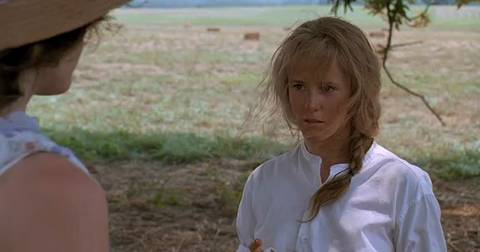
A Competition with Consequences
In Fried Green Tomatoes, there are moments that turn ordinary Southern life into something mythic—charged with quiet rebellion, fierce loyalty, and subversion hidden beneath humor. One such moment takes place during Whistle Stop’s annual barbecue festival, where Idgie Threadgoode and Big George join forces in a contest meant to be lighthearted and fun, but which quickly becomes a defining act of courage and resistance.
The scene begins in high spirits. Townsfolk gather in the town square, music floats on the humid air, children run between booths, and the smell of smoked meat curls up from dozens of grills. Idgie and Big George work side-by-side behind their booth, laughing, bickering, tossing spices and sauces with the effortless camaraderie that comes from years of trust. Ruth watches with amusement and a quiet pride—this is the family they built, and they belong here.
But things change when a local rival—an older white man with a history of sneering at both Idgie and Big George—strolls over. With a smug grin and a drawling insult, he calls George a “boy” and suggests that no real cooking can come from a “colored man” unless it’s under a white woman’s supervision. It’s a public humiliation. The crowd goes quiet. And then, Idgie steps forward.
Standing Up Loud and Proud
Without hesitation, Idgie punches the man square in the jaw.
It’s not a fair fight—she gets in the only hit. The man stumbles back, shocked more by the boldness than the force of the blow. A murmur spreads through the crowd. Someone calls for calm. A judge threatens to disqualify her. Ruth gasps. Big George says nothing—but his eyes shine with something close to gratitude.

Idgie doesn’t apologize. She doesn’t explain. She simply says, “You don’t speak to my family like that.” And with that, she turns back to the grill, wipes her hands, and keeps working.
This act, so brief and spontaneous, becomes one of the most iconic moments in the town’s folklore. Not because of the violence, but because of the values it reveals. In a world where people often looked the other way, Idgie made a choice—to stand between injustice and those she loves, regardless of consequence.
Ruth’s Reaction
Initially, Ruth is horrified. Violence makes her deeply uncomfortable, especially public violence. She sees the danger—not just to Idgie, but to Big George, whose safety in their segregated world is always precarious. She pulls Idgie aside, scolding her gently but firmly.
“You can’t go around hitting people just because they’re wrong,” she says. “You’ll bring trouble down on all of us.”
But Idgie, still simmering, replies, “Then let it come. I won’t let anyone humiliate George while I stand still.”
Later that night, after the crowd has dispersed and the booths have been packed away, Ruth sits beside Idgie on the café steps. She doesn’t apologize for her worry, and Idgie doesn’t retract her action. But Ruth, in a quiet voice, says, “Thank you.” It’s a small sentence, but loaded with understanding. She sees now—Idgie’s wildness isn’t reckless. It’s protective. And beneath her scrappy bravado lies an unshakable sense of justice.
Becoming a Legend
They don’t win the competition.
Another team, one that played by the rules and didn’t cause a scene, takes home the blue ribbon. But by the next morning, nobody in Whistle Stop is talking about the winners. They’re all talking about Idgie Threadgoode and the punch seen ‘round the square.
To the older generation, it’s another notch in Idgie’s long list of outbursts—proof that she’ll never be a proper lady. But to the youth, the misfits, and those watching from the margins, Idgie becomes something else entirely: a local legend.
The story grows with each telling. Some say she knocked the man out cold. Others claim she flipped a rack of ribs into the air at the same time. What matters isn’t the facts—it’s the symbolism. In a town bound by racial codes and gender expectations, a woman stood up publicly for a Black man, and she didn’t flinch. That’s the story they remember.
Big George’s Quiet Gratitude
Big George never makes a big speech about it. That’s not his way. But from that day forward, a subtle shift occurs. He and Idgie already shared a bond, but now, there’s something deeper—a recognition that words can’t contain. He begins to bring extra meat scraps for Idgie’s fishing trips. He watches over Buddy Jr. with a little more closeness. He never brings up the punch, but his loyalty deepens, solidifies, cements.
For a man who has had to move carefully through every space he inhabits, Idgie’s recklessness is both terrifying and sacred. She breaks the rules because she can, and she uses that privilege to protect others. It’s not perfect. It’s not safe. But it’s real.
The Café as a Space of Resistance
This moment also changes the energy at the café. People start to come not just for the food, but because they know it’s a place where decency matters more than decorum. Travelers hear about “that café run by two women and a Black family” and stop by out of curiosity. Some come to criticize. Most return with full bellies and softened hearts.
Ruth and Idgie never put up a sign that says “Everyone Welcome.” They don’t need to. The message is in the way they live. And the barbecue festival is a key part of that legacy.
Conclusion: The Punch That Echoed
The punch Idgie throws during the barbecue festival isn’t just about one insult or one moment. It’s about drawing a line in the sand and saying, “Not here.” It’s about using whatever voice, body, or courage you have to stand beside the people who make your life meaningful.
For all her flaws, Idgie shows us that love can look like defiance. That protecting someone doesn’t always come in soft words and quiet comfort—it can come in fists, in fury, in fire. The festival, with all its smoke and sweetness, becomes the birthplace of a legend—not because of a trophy, but because of a truth.
In Whistle Stop, stories matter. And the story of that day—the day Idgie punched a man for insulting Big George—is the one they never stop telling.
